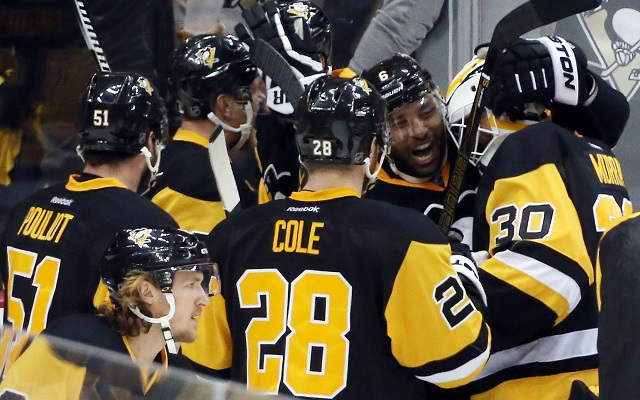The Pittsburgh Penguins are one win away from advancing to the Eastern Conference finals after earning a huge 3-2 overtime victory against the Washington Capitals in Game 4 to take a 3-1 series lead.
Patric Hornqvist scored the overtime winner off a brutal turnover in the Capitals’ zone, adding an extra dose of heartbreak for Washington. It’s especially tough because the Caps controlled play for most of the game, especially toward the end, and were probably the better team in Game 3 as well. However, they'll leave Pittsburgh with no wins and on the brink of elimination.
Here are the key takeaways from Wednesday night’s game:
1. The Capitals know this feeling all too well: The Washington Capitals had another game where it seemed like they controlled play for a good portion of the game. They were especially dangerous in the third period, tilting the ice into Pittsburgh's end for much of the final frame. They had nothing to show for it and now have nothing to show for Game 4.
Now they’re on the brink of elimination in a 3-1 series hole. This is not supposed to be the same old Capitals, but they failed to take advantage of an injury- and suspension-depleted Penguins defense. This was the matchup that made them heavy favorites on paper and they couldn’t get it done.
These next two days off, every question leading into Game 5 is going to come with some connection to the team’s history of postseason struggles and their inability to get out of the second round. The word "choke" is going to come up a lot, too. On top of the pressure of the game, they're going to have to find a way to tune that out if they want to change their postseason narrative.
2. That OT goal couldn’t have been more heartbreaking for Washington: The Penguins ended the game with a little help from the Capitals. Defenseman Mike Weber, who played in one previous game this postseason before being inserted into the lineup in Game 4, is the one wearing goat horns.
He failed to control a puck with no one around him, then desperately swiped at it to get the puck to the boards. Instead, he put it right on Patric Hornqvist’s tape. Game over.
What a time to find a loose puck.
— #StanleyCup Playoffs (@NHL) May 5, 2016
Game: 3-2
Series: 3-1 #StanleyCuphttps://t.co/Te6gwegwdh
Weber played in place of Nate Schmidt, who didn’t have his best game in Game 3. Still, Schmidt had been playing more and probably gives the Capitals a little more versatility on their back end. Weber was the least-utilized blueliner on the Capitals bench in the game and in his one and only overtime shift, the in-season acquisition cost them big time.
You have to feel for Weber for the hard-luck play, but you also have to question the decision to put him in the game at all. Hindsight is 20-20, of course.
3. Penguins defense held its own without Letang: Coming into Game 4, everyone wondered how the Penguins would hold up with Kris Letang suspended and Olli Maatta injured. It turns out, just fine. Trevor Daley was the acting No. 1 defenseman, playing seven more minutes than any other Pittsburgh blueliner and he thrived.
Daley scored the Penguins’ first goal, albeit in a rather fluky manner. He also played solid, steady defense, moved the puck well and did all the things the Pens needed him to do in Letang’s absence. Remember when Pittsburgh acquired him for Rob Scuderi straight up? What a trade that has turned out to be. This performance will be remembered if the Penguins keep progressing.
Daley wasn’t alone in his solid play on the back end, though. Others like Ian Cole and Ben Lovejoy kept their games simple and never really seemed to cost the Pens. They didn’t let the Capitals get too many great chances.
On top of all of that, Matt Murray turned in another great performance to help make sure nothing leaked through if the defense ever did falter. The rookie netminder finished the game with 34 saves. His six wins this postseason helped him set the record for most playoff victories by a rookie goaltender, per NHL PR.
4. The nastiness persists: Despite two players sitting out Game 4 with suspensions, the intensity of the series did not at all fade in this one. There were multiple instances where tempers flared, penalties were committed and players toed the line.
Evgeni Malkin;s hit on Daniel Winnik was one of the standout moments as it was a hard body check that appeared to include some head contact. However, this looked more like the situation Jonathan Drouin found himself in against Islanders defenseman Thomas Hickey on Tuesday night.
Here’s the Malkin hit on Winnik pic.twitter.com/iVlLu5CU8N
— Pete Blackburn (@PeteBlackburn) May 5, 2016
That’s a close one, but is doubtful to lead to a suspension or anything like that.
There was also this slash from Alex Ovechkin that caught Sidney Crosby in the hands. Crosby had to temporarily leave the game and was pretty riled up by it, smashing his own stick on the wall while heading to the dressing room. He did return, but even though that’s definitely a slash, those kind of whacks happen a lot over the course of a game.
There were plenty of other hits throughout the game that brought a little extra attention, some even drew penalties, and there were no signs of things cooling down between these two teams. We'll have to see if it changes at all with every game the rest of the way, no matter how long the series goes, being a potential elimination game.
5. The Penguins ended a long overtime drought: Coming into Wednesday night's action, Pittsburgh had lost eight consecutive games decided in overtime in the playoffs. That includes Game 1 of this series.
The overtime futility has been one of the reasons Pittsburgh hasn’t been able to get over the hump in recent playoff runs. You have to find ways to win tight games and they've done that often in this series and now have done it in an overtime situation.
This was actually their first home OT win in the playoffs since 2009. Their opponent?
.@penguins won their 1st home playoff game in OT since Game 3 of 2009 CSF vs. WSH, snapping a 6-game losing streak. pic.twitter.com/9S9zAaEFKr
— NHL Public Relations (@PR_NHL) May 5, 2016
The Pens are now 8-3 all-time in playoff overtime games against the Caps.


















